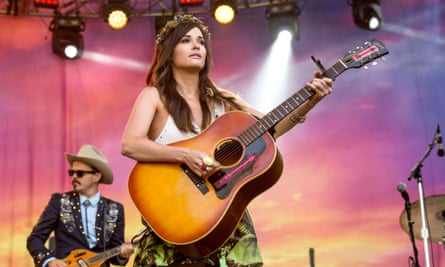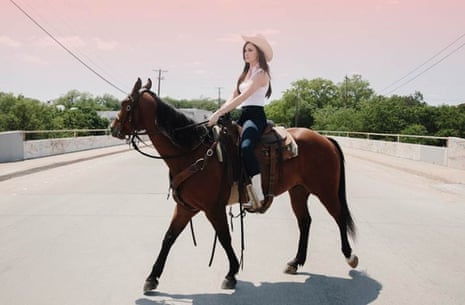Back in June, at Tennessee’s Bonnaroo festival, Kacey Musgraves finished her performance of new single Biscuits on a sour note. “They just pulled that one off the fucking radio,” she told the crowd. “Whatever that means. Maybe they don’t like biscuits.”
It was a familiar rut for the small-town-Texas songwriter. Two years earlier, she battled to get songs from her major-label debut, Same Trailer Different Park, playlisted on country radio. It’s easy to see why songs like Follow Your Arrow (key lyric: “Kiss lots of boys, or kiss lots of girls if that’s something you’re in to”) didn’t appeal to programmers keen to avoid offending God-fearing audiences.
Biscuits, though, is so down-home that lines such as “Mind your own biscuits and life will be gravy” almost seemed written to get back in programmers’ good books. It dropped off the country airplay charts at No 41, and didn’t dent the Billboard Hot 100.
The 26-year-old songwriter isn’t worried, though. Follow Your Arrow went on to win 2014’s Country Music award for song of the year. Another first-album single, Merry Go ’Round, won the 2014 Grammy for best country song, while Same Trailer won best country album. “I look at a song like Follow Your Arrow, which has done more for me than any song in my entire career,” says Musgraves by phone, somewhere north of New York in between tour stops. “I didn’t have any expectations for it, but it brought so many people to the party that wouldn’t have been there before, it opened some minds, it made some people walk a little bit taller that felt like they didn’t really have a place in country music even if they wanted to. If you look at what it did on the radio, it might not make sense matched up to what it did in different areas. There’s a disconnect there – I’m not really sure what it means. Maybe there’s different metrics of success here, and that’s fine.”

Following the June release of her second major-label album, Pageant Material, Musgraves finds herself straddling several metrics of success – a rare position for a heartland country star, and one that’s become almost as controversial as her earlier lyrics. She’s soon to sing in an as-yet-unannounced Disney project, and she appears on her hero Brian Wilson’s new album, No Pier Pressure. Tastemaking website Pitchfork rarely reviews mainstream country releases, but it gave the record an effusive eight out of 10. Hip music magazine the Fader made her its first country cover star, with a headline that proclaimed: “Kacey Musgraves is making country good again”. It’s an attitude shared by fans that she has introduced to the genre, but an endorsement founded on the snobbish dismissal of the working-class values that underpin less “clever” country.
For her part, Musgraves loves a term that has come to follow her around: country music for people who don’t like country. “I hear that all the time,” she says. “‘I hate country music usually, but I really love yours.’ Something in that makes me very happy. I’ve always just wanted to make music – it just happens to be very country. I can’t really get away from that. I’d sound country even if I didn’t want to.”
Indeed, she was bred for it. Musgraves first sang in church aged eight, wrote her first song, Notice Me, aged nine and got her first guitar when she turned 12. A year later, her parents helped her release her first album, Movin’ On, which featured songs such as Sweet Prairie Muffin and I’ve Been Everywhere. Her grandma acted as her booking agent, landing the teen singer slots on the so-called Opry circuit. She made a name for herself as a yodelling queen, and covered the likes of Hank Williams and Patsy Cline.
Pageant Material is steeped in her long-abiding love of country tradition. Its 13 songs feel like a sigh of relief that relaxes into a gentle swing reminiscent of Bobbie Gentry and Glen Campbell and bears traces of traditional Hawaiian and mariachi music. She and her co-writers spent a week writing in the Texan desert before decamping to Nashville’s famous RCA Studio A (which has previously hosted sessions by Elvis Presley and Dolly Parton) to record live. “It has a lot of really good vibes,” says Musgraves. “It’s stuck in time a little bit; that’s one of the reasons I really love it.” After Musgraves supported Willie Nelson and Alison Krauss last year, she persuaded Nelson to reprise his old hit Are You Sure for a hidden bonus track.
Her old-timey tastes haven’t delighted the newer fans and critics who were so quick to claim her as their own. Pageant Material isn’t a huge progression from Same Trailer; some of the songs were written during the first album sessions. “My songwriting mode is the same as it always has been,” she says. “It was just a big basket of songs that I really liked. I don’t get as much time to write as I would like. It would be nice to really take some time off for the next one and really write a lot.” Whereas 2013’s Merry Go ’Round offered a sharp but kindly look at the cyclical nature and mores of small-town life (“We get bored, so we get married, just like dust, we settle in this town”), Pageant Material opener High Time isn’t a stoner anthem, but rather a call for Musgraves to get back to her roots. “Got too big for my britches,” she sings on the second track, Dimestore Cowgirl, although she can’t point to any specific instances of big-headedness. “I’m sure my outlook has changed in a roundabout way,” she says. “I’ve seen all this cool shit, but I’m still the same. My hometown is still my hometown – I’m still this girl from this little bitty town. I don’t feel like my core has changed as a person.”
Gone are the characters that peppered Same Trailer – such as the brilliantly bitter waitresses of Blowin’ Smoke – in favour of more sweeping statements, such as the self-explanatory “Can’t live with ’em, can’t live without ’em” stance of Family is Family, and This Town. “That came from a story my sister told me when she went to this small town in Texas called Marfa – it’s a unique, cool place,” she says. “She made friends with a local chick and asked the girl, ‘What’s it like to live here?’ She said: ‘Well, for one thing, this town’s way too small to be mean.’ I really loved that. It’s true. You can be an asshole in a big city and it’s not going to come back to you as much, but, in a small town, it’s very transparent. You see what you get with people, and that’s just the way it is.”
The only explicit rejection of old mores comes on Good Ol’ Boys Club, a kickback at country’s all-powerful gatekeepers. “Being part of a big machine don’t sound like fun to me,” she sings, ostensibly hitting out at Taylor Swift’s label, although Musgraves – who has a pop star’s careful interview technique – claims it could apply to “any situation, any big machine, any group of people who choose based on trivial things”.
So, what has happened to Musgraves’s rebel spirit? Where is the LGBT ally, the advocate of getting high, to whom newcomers had pledged allegiance? “Nothing that anyone has said has really affected the way that I create,” says Musgraves, more forcefully. “I don’t wanna repeat myself. I’ve already said those things. That doesn’t mean I’m scared to say them any more. I’m moving on, I’ve tackled those things and said what I wanted to say. Let’s look at other topics.”
Musgraves’s strongest rebel move is being herself and advocating for others to kick back at societal expectations. She knows the power of a neatly tweaked platitude. Pageant Material’s Cup of Tea offers a breezy assessment of potential personal shortcomings: “Maybe your jacket is a hand-me-down / Maybe you slept with half of your hometown.” At the point you’d expect comfort in the form of assurances of future success or a deeper inner beauty, Musgraves shrugs: “You can’t be everybody’s cup of tea … Nobody’s everybody’s favourite / So you might as well just make it how you please.” She attributes her compassionate outlook to a childhood friend coming out to her in his teens, although she says she’s not consciously avoiding a striving narrative. “I don’t think there always has to be a rainbow. Sometimes it’s nice.”
Without being as explicit as she was on her debut, Musgraves’s second major-label album makes subtle points about the catch-22 of being a woman in country, a phrase that usually only comes up to point out the pitfalls of being one. Pageant Material’s title track points out Musgraves’s unsuitability for the beauty shows so beloved of the south (“It ain’t that I don’t care about world peace, but I don’t see how I can fix it in a swimsuit on a stage”) and also subtly alludes to a moment at 2013’s Country Music awards where Miranda Lambert beat Musgraves to female vocalist of the year. A camera caught Musgraves looking severely bummed, rather than clapping through a beatific smile. Even though the two women are friends and Musgraves wrote Mama’s Broken Heart for Lambert, it created a minor firestorm. “I’d rather lose for what I am than win for what I ain’t,” she sings.
“Humans are humans, and I find it funny that people really want someone to be real until they’re not,” Musgraves says of the situation. “People will always choose to be offended by things no matter what, and it’s not really my place to alter myself to make up for that. Women, especially, are expected to act in a certain way – be completely beautiful, completely perfect, smile even if you lose – and I think a lot of times those things are unrealistic. I like to see real people react in real ways.”
Good Ol’ Boys Club precipitated a recent scandal in which country radio consultant Keith Hill advised against playlisting “females”: “They’re just not the lettuce in our salad. The tomatoes of our salad are the females.” It lived up to the song’s damned-if-you-do sentiment: even if female artists meet the genre’s suffocating expectations, they will still be sidelined. “I don’t think I’m educated enough on radio research to make a comment,” says Musgraves. “I get that he was just relaying data, but he could definitely have used a nicer analogy.” She’s not sure when women started getting marginalised, but she sees a sea change coming. “For a while, it was about having a big voice or looking hot. Now I think it’s coming back around to having something to say, which I think is great. I hope that becomes the new norm.”

Comments (…)
Sign in or create your Guardian account to join the discussion